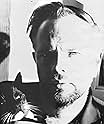Philip K. Dick(1928-1982)
- Writer
- Actor
Philip Kindred Dick was born in Chicago in December 1928, along with a
twin sister, Jane. Jane died less than eight weeks later, allegedly
from an allergy to mother's milk. Dick's parents split up during his
childhood, and he moved with his mother to Berkeley, California, where
he lived for most of the rest of his life. Dick became a published
author in 1952. His first sale was the short story "Roog." His first
novel, "Solar Lottery," appeared in 1955. Dick produced an astonishing
amount of material during the 1950s and 1960s, writing and selling
nearly a hundred short stories and some two dozen or so novels during
this period, including "Do Androids Dream of Electric Sheep?," "Time
Out Of Joint," "The Three Stigmata of Palmer Eldritch," and the
Hugo-award winning "The Man In The High Castle." A supremely chaotic
personal life (Dick was married five times) along with drug
experimentation, sidetracked Dick's career in the early 1970s. Dick
would later maintain that reports of his drug use had been greatly
exaggerated by sensationalistic colleagues. In any event, after a
layoff of several years, Dick returned to action in 1974 with the
Campbell award-winning novel "Flow My Tears, The Policeman Said."
Perhaps more importantly, though, this same year Dick would have a
profound religious experience that would forever alter his life. Dick's
final years were haunted by what he alleged to be a 1974 visitation
from God, or at least a God-like being. Dick spent the rest of his life
writing copious journals regarding the visitation and his
interpretations of the event. At times, Dick seemed to regard it as a
divine revelation and, at other times, he believed it to be a sign of
extreme schizophrenic behaviour. His final novels all deal in some way
with the entity he saw in 1974, especially "Valis," in which the
title-character is an extraterrestrial God-like machine that chooses to
make contact with a hopelessly schizophrenic, possibly drug-addled and
decidedly mixed-up science fiction writer named Philip K. Dick. Despite
his award-winning novels and almost universal acclaim from within the
science-fiction community, Dick was never especially financially
successful as a writer. He worked mainly for low-paying science-fiction
publishers and never seemed to see any royalties from his novels after
the advance had been paid, no matter how many copies they sold. In
fact, one of the reasons for his extreme productivity was that he
always seemed to need the advance money from his next story or novel in
order to make ends meet. But towards the very end of his life, he
achieved a measure of financial stability, partly due to the money he
received from the producers of Blade Runner (1982) for the rights to his novel "Do
Androids Dream Of Electric Sheep?" upon which the film was based.
Shortly before the film premiered, however, he died of a heart attack
at the age of 53. Since his death, several other films have been
adapted from his works (incuding Total Recall (1990)) and several unpublished
novels have been published posthumously.





















